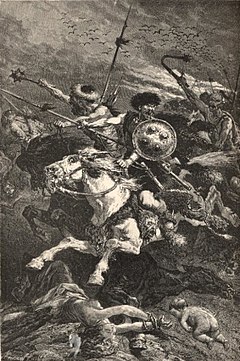Barbarian

A barbarian is a human who is perceived to be either uncivilized or primitive. The designation is usually applied as a generalization based on a popular stereotype; barbarians can be members of any nation judged by some to be less civilized or orderly (such as a tribal society) but may also be part of a certain "primitive" cultural group (such as nomads) or social class (such as bandits) both within and outside one's own nation. Alternatively, they may instead be admired and romanticised as noble savages. In idiomatic or figurative usage, a "barbarian" may also be an individual reference to a brutal, cruel, warlike, and insensitive person.[1]
The term originates from the Greek: βάρβαρος (barbaros pl. βάρβαροι barbaroi). In Ancient Greece, the Greeks used the term towards those who did not speak Greek and follow classical Greek customs.[2] In Ancient Rome, the Romans adapted and used the term towards tribal non-Romans such as the Amazighs, Germanics, Celts, Iberians, Thracians, Illyrians, and Sarmatians. In the early modern period and sometimes later, the Byzantine Greeks used it for the Turks in a clearly pejorative manner.[3][4] In Ancient China, references to barbarians go back as far as the Shang Dynasty and the Spring and Autumn Annals.[5] Cultures of the "" (Chinese: 化外之地; pinyin: Huà wài zhī dì) or areas outside of range of the Emperor were generally labeled as "Barbarians" or uncivilized through the lens of Sinocentrism.
Etymology[]


The Ancient Greek name βάρβαρος (barbaros), "barbarian", was an antonym for πολίτης (politēs), "citizen" (from πόλις – polis, "city-state"). The earliest attested form of the word is the Mycenaean Greek